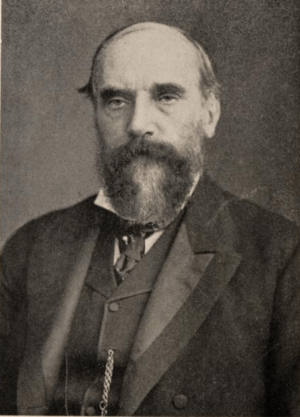Charles D. F. Phillips facts for kids
Charles Douglas Fergusson Phillips (1830–1904) was a British medical doctor. He was also a well-known author. He wrote important reference books about materia medica. This is a field that studies how different substances can be used as medicines. His books covered both natural substances, like plant extracts, and inorganic substances, such as salts or acids.
Life and Work
Charles D. F. Phillips was born in 1830. He was the fifth son of Captain R. Phillips, a soldier who fought in the Peninsular War and the Battle of Waterloo. Charles studied medicine in Edinburgh and at Marischal College in Aberdeen. He earned his first medical degree in 1852.
He started his medical practice in Manchester. In 1859, he received his M.D. degree. For a time, he practiced a type of medicine called homeopathy in Manchester. However, he later changed his approach. In 1867, he moved to London. There, he became a very successful doctor and earned a lot of money.
A Difficult Accident
In 1878, Dr. Phillips was in a railway accident. This accident caused him serious injuries. After a long legal process, he was awarded a large sum of money for his injuries. It was said to be the biggest amount ever given for such a case at that time. Before the accident, he was earning a lot of money each year.
It took several years for him to recover. He was finally able to return to his medical practice in 1883.
Teaching and Writing
Dr. Phillips was a lecturer at the Westminster Hospital Medical School for a long time. He taught about materia medica and therapeutics. Therapeutics is the study of how to treat diseases. He also worked as an examiner for medical students. He examined students at the Universities of Aberdeen, Glasgow, and Edinburgh.
He wrote several books about how medicines work and how to use them. Some of his books became very popular.
Later Years and Interests
In his later years, Dr. Phillips became very interested in a debate about animal testing. He was part of the Physiological Society. He worked to show the methods used by people who were against animal testing, known as antivivisectionists.
He was also a Fellow of the Royal Society of Edinburgh. He received honorary degrees from the Universities of Edinburgh and Aberdeen.
About a year before he passed away, Dr. Phillips stopped practicing medicine. He was asked to represent the Universities of Glasgow and Aberdeen in Parliament. This was a great honor, but he chose to decline it. He died in November 1904. This was just after the third edition of his important book, Materia Medica, was published.


